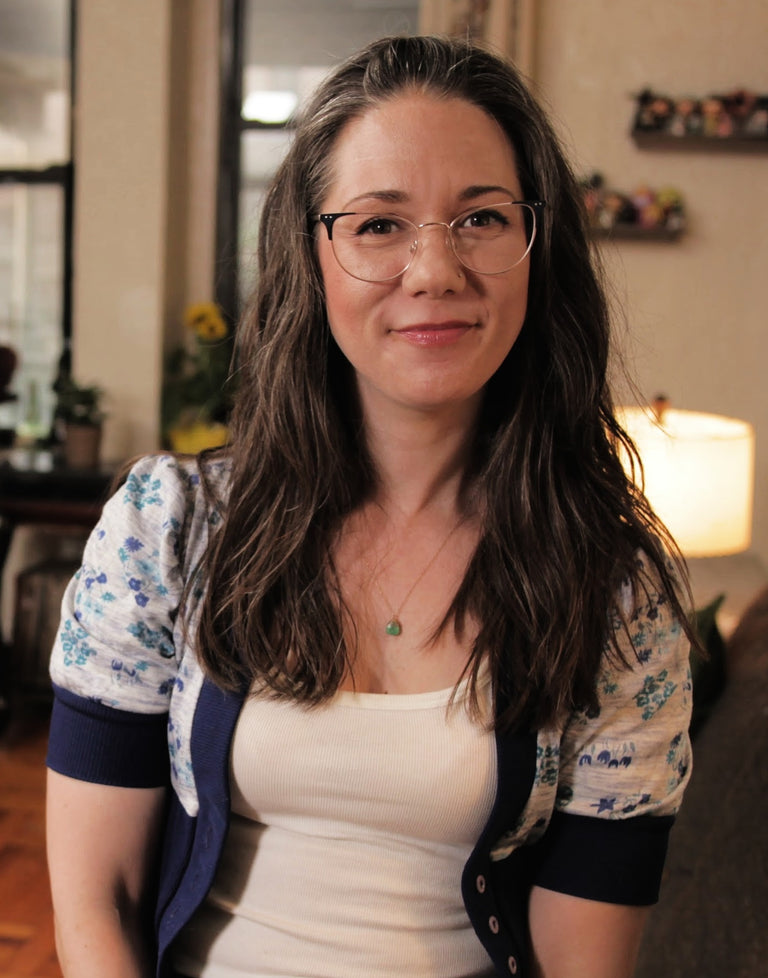If you’re pregnant, you might have been told that you’re "glowing"—and many women even notice that baby magic spreading to their scalps, with their hair getting thicker and more luxurious while they’re expecting.
Hormones cause a lot of changes in your body during pregnancy, but could they also cause you to experience hair loss? Read on to uncover what happens to your hair follicles while you're pregnant, and learn how you can support optimal hair wellness throughout your pregnancy.
Pregnancy and Hair Cycles
Maybe you’ve heard that hair gets thicker and fuller during pregnancy, and the good news is that it’s not just an old wives' tale. Changes during pregnancy increase levels of estrogen and other hormones in the body, and these hormones impact the duration of normal hair growth cycles.
“During pregnancy, there is a change in the length of each cycle of hair growth,” explained Dr. Erum Ilyas, board-certified dermatologist and founder of AmberNoon. Our follicles produce hair in a cycle of phases. First is the anagen phase, the period of active growth during which a follicle produces hair continuously. The anagen phase is the longest phase and can last for several years. Next comes the catagen phase, when a follicle stops hair growth over the course of a few weeks. The hair then enters the telogen phase, during which it rests in the follicle for about three months. Finally, during the exogen phase, the hair falls out.
“During pregnancy, there is a lengthening of the anagen phase, with less hairs transitioning to the resting phase where they can potentially shed,” said Dr. Ilyas. “With more hair in the active growth phase, there is the appearance of thicker hair.”
Longer anagen phases mean less hair falling out during pregnancy, which temporarily increases the volume of hair on your head while you’re expecting.
BEST SELLER: GRO More Kit for Hair
Postpartum Hair Loss
Postpartum hair loss is a temporary and typically fully reversible form of hair loss that happens after pregnancy. After you give birth, another huge hormonal shift occurs, and all those strands that didn’t fall out while you were pregnant will move into the resting telogen phase to be eventually shed.
The significant hormonal changes that are triggered when you give birth can also cause additional hair follicles to transition prematurely to the telogen phase, and you might experience a more drastic bout of hair loss (called telogen effluvium) about three months after delivery.
What to Expect After You’re Expecting: Postpartum Hair Loss, Explained
What About Hair Loss During Pregnancy?
Since the hormonal increases associated with pregnancy tend to prevent hair shedding, abnormal hair loss during pregnancy is uncommon—but it’s not impossible.
“If there is hair loss in excess of normal hair shedding during pregnancy, [it] would imply some sort of trigger,” Dr. Ilyas explained. “Anemia, thyroid abnormalities, poor blood sugar control, blood pressure changes, hormonal fluctuations, stress, and other triggers for telogen effluvium could be at play.”
Luckily, permanent hair loss during (and after) pregnancy is not typical—but continue reading to better understand what could be at play behind hair falling out while you're expecting.
#include-related-slider#
Gestational Hypothyroidism
It is also possible (though rare) for thyroid function to slow during pregnancy. Called hypothyroidism, this condition occurs when the thyroid gland does not produce or secrete enough hormone. Just 2 to 3% of women experience gestational hypothyroidism, and it is treatable. Thyroid hormone is important for fetal development, and it also plays a part in the functioning of our hair follicles—so if you have gestational hypothyroidism, it might lead to hair loss, among other symptoms.
Read More: Hair Loss and Thyroid Disorders
Anemia & Other Nutritional Deficiencies
Iron deficiency—or anemia—is a more common occurrence during pregnancy and has been linked to hair loss. Fortunately, iron levels (along with other vitamins and minerals) can be easily monitored during pregnancy by way of routine blood tests. Anemia and any associated hair loss—during pregnancy or otherwise—can be addressed with supplements or through changes to diet.
Another rare pregnancy-related condition, hyperemesis gravidarum, or HG, can also indirectly cause nutritional deficiencies. Characterized by extreme nausea and vomiting, the symptoms of HG can prevent expecting mothers from eating or drinking normally, a side effect that can be completely debilitating.
Fill In the Blanks: What Vitamin Deficiencies Cause Hair Loss?
Gestational Diabetes
Gestational diabetes refers to diabetes diagnosed in pregnant women who don’t have a prior diabetes diagnosis. It’s fairly common, developing in 2 to 10% of pregnancies, and typically develops during the second or third trimester. According to the CDC, about half of women who develop gestational diabetes will go on to develop type 2 diabetes after pregnancy. Diabetes and insulin resistance are associated with hair loss in multiple ways.
When Does Hair Loss Happen During Pregnancy?
So, is there a specific trimester of pregnancy when expecting moms might lose hair? The short answer is that it's more likely to occur later on.
“Technically, [hair loss] is possible at any point of the pregnancy; however, based on the timing of when gestational diabetes, stress, and blood pressure changes occur, the second and third trimester may be the most likely time for hair loss to occur,” Dr. Ilyas explained. With that said, you might still notice increased hair shedding during your first trimester or at any other point during pregnancy.
See also: How to Minimize Hair Loss from Stress
Managing Hair Loss While Pregnant
If you’re pregnant and and are noticing what seems like more hair shedding than normal, talk to your doctor right away, as it could be a sign of an underlying health issue.
“Discussing [excessive hair loss] with your obstetrician is important to evaluate bloodwork, blood pressure, and ensure that there are no abnormalities that need to be addressed,” Dr. Ilyas added. Be sure to talk to your doctor before you begin taking any supplements or making changes to your diet or routine.
Here are some ways to support healthy hair during pregnancy that are equally applicable and important for hair wellness when you’re not pregnant, too!
Shop: GRO Biotin Gummies
Focus On A Healthy Diet
The building blocks for healthy hair are best obtained through food sources, such as fresh fruits and veggies and healthy proteins and fats.
There are plenty of healthy, hair-friendly foods you can add to your diet during pregnancy and beyond. Tangerines, strawberries, oats, peanut butter and avocado are just a sampling of delicious and nutritious foods that help support healthy follicle function and are safe to eat while pregnant.
Munch on This: 12 Best Foods for Hair Growth
Give Your Scalp Some TLC
If you’re dealing with increased hair shedding while pregnant, think about giving your scalp a little extra TLC so your follicles are pampered to the max.
Avoid tight hairstyles, such buns, ponytails, extensions and braids, and limit heat styling whenever possible. Skip potentially harsh chemical treatments, which some experts recommend avoiding altogether, anyway.
Consider a topical treatment to encourage thicker-looking hair like best-selling GRO Hair Serum. It leaves hair looking thicker, healthier, stronger and more resilient.
Can You Use VEGAMOUR Hair Serums While Pregnant or Breastfeeding?
We get this question a lot. Only your obstetrician can you tell you what's safe for you, but, we can tell you that the reason that most serums aren't safe for pregnant women is because they contain hormones. And the more common hair serums contain minoxidil, which is a drug. VEGAMOUR hair serums do not contain synthetic hormones, nor do they contain drugs.
They're always vegan and natural. But just to be sure, we'd recommend that you take a list of the ingredients (found on any product page) to your doctor.
Manage Stress
Stress is never any fun, but it's especially burdensome when you’re carrying a baby. And yet, there are many parts of being pregnant that can create stress in and of themselves, to say nothing of normal life stressors.
Since stress can impact how our hair follicles behave, worry over hair loss can ironically cause more hair loss. When you’re managing stress for two, consider how the things you can control—like a healthy sleep schedule and daily routine—might better support you, allowing you to decrease levels of cortisol (the stress hormone) in the body.
You can also incorporate mindfulness techniques in your day, such as meditation, prenatal yoga, spending time outdoors or just having a good laugh. These are all natural ways to reduce cortisol.
And while you’re indulging in some extra TLC, consider treating yourself to a scalp massage. In one study, scalp massages were linked to decreased cortisol, blood pressure and heart rates, and another indicated that scalp massages could stimulate new hair growth—win, win, win!
Shop: Dr. Neera Nathan's Top VEGAMOUR Picks
The Takeaway
Thinning hair (or loss of hair) during pregnancy is uncommon, but it can happen. When it does occur, an underlying condition is typically at play, causing hair to fall out. So if you’re pregnant and noticing excessive hair shedding or thinning, be sure to talk to your doctor as soon as possible.
Taking a holistic approach to your hair wellness through your health and well-being is good for your hair follicles, your baby and yourself alike — so treat yourself right, hair and otherwise!
#include-related-slider#
More From VEGAMOUR
- 9 Hair Problems Only Moms Deal With
- 5 Ways Hormones Can Affect Your Hair
- Can You Prevent Postpartum Hair Loss?
- Shop VEGAMOUR Best Sellers
Photo credit: Jonathan Borba/Unsplash
Back


















